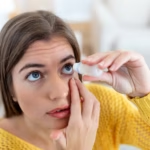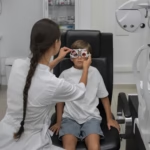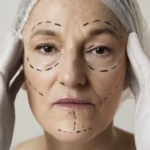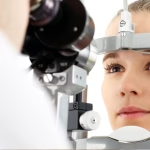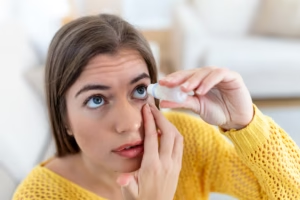Macular degeneration is a common age-related eye disease that affects the macula, the small but critical part of the retina responsible for central vision. This condition can make daily activities like reading, driving and recognizing faces increasingly difficult. As one of the leading causes of vision loss in adults over 50, understanding its signs, causes and treatment options is essential for protecting long-term eye health.
Understanding Macular Degeneration
The macula provides the sharp, detailed vision needed for tasks that require focus. When this area begins to deteriorate, vision becomes blurred or distorted in the centre while peripheral vision usually remains unaffected. This disease is most often referred to as Age-Related Macular Degeneration (AMD), since aging is the primary factor that contributes to its development.
There are two main types of macular degeneration, dry and wet and each affects the eye differently.
Difference Between Wet and Dry Macular Degeneration
Dry macular degeneration (also called atrophic AMD) is the more common form, representing nearly 80 to 90% of all cases. It occurs gradually as the macula thins with age and tiny yellow deposits known as drusen accumulate beneath the retina. Over time, these deposits damage light-sensitive cells, leading to a slow and progressive decline in vision.
Wet macular degeneration (or neovascular AMD) is less common but more severe. It happens when abnormal blood vessels grow beneath the retina and begin to leak fluid or blood. This leakage distorts central vision and can lead to rapid and permanent vision loss if left untreated. Immediate care from a is critical in such cases, as wet age macular degeneration treatment injections can significantly slow down or stop vision damage.
Macular Degeneration Symptoms
Macular degeneration often develops silently. In its early stages, vision may appear normal and symptoms may not be noticeable until the disease progresses. As it advances, patients may begin to notice changes such as
- Blurred or distorted central vision
- Straight lines appearing wavy or bent
- Dark or empty spots in the centre of vision
- Reduced colour brightness or contrast sensitivity
- Difficulty reading or recognizing faces
- Needing brighter light to see clearly
If any of these signs occur, scheduling a comprehensive eye exam with a macular degeneration specialist near you is essential for accurate diagnosis and early management.
What Causes Macular Degeneration?
The exact cause of macular degeneration is not fully understood but several factors contribute to its onset and progression. Aging is the primary risk factor which is why it is often called age-related macular degeneration. Over time, natural wear and oxidative stress damage the macular cells.
Other causes and risk factors include genetic predisposition, smoking, poor diet, obesity and high blood pressure. Smoking in particular, is one of the strongest modifiable risks, it restricts blood flow to the retina and accelerates damage. People with a family history of AMD are also more prone to developing the disease. Additional contributors include prolonged UV exposure, high cholesterol and blue light exposure from digital screens. Managing these risk factors can play a key role in slowing disease progression.
Who Is at Higher Risk?
Certain individuals are more susceptible to macular degeneration. Those over 50 are naturally at greater risk due to the aging process. Smokers, individuals with high cholesterol or cardiovascular issues and people with lighter eye colour (which are more sensitive to UV light) are also more vulnerable. Women, according to research may have a slightly higher risk than men. Anyone with a family history of age-related macular degeneration should be especially vigilant about regular eye exams.
Diagnosis of Macular Degeneration
Early diagnosis can prevent significant vision loss. An experienced macular degeneration specialist will use advanced diagnostic tools to detect and monitor changes in the retina. Tests may include
- Comprehensive dilated eye examination, allowing the doctor to inspect the retina and macula.
- Amsler grid test, which helps identify visual distortions such as wavy lines.
- Optical Coherence Tomography (OCT), a detailed imaging scan showing layers of the retina.
- Fluorescein angiography, used to detect abnormal blood vessels or leakage (especially for wet AMD).
These tests help determine whether the condition is wet or dry which is crucial for selecting the right treatment approach. Regular checkups with a top macular degeneration specialist near you ensure early intervention and better outcomes.
Prevention and Lifestyle Management
While macular degeneration cannot always be prevented, certain lifestyle habits can help reduce risk and slow its progression. Healthy living plays a vital role in maintaining retinal health.
Nutrition and Supplements
A diet rich in antioxidants, lutein, zeaxanthin, zinc and omega-3 fatty acids is beneficial for eye health. Foods such as spinach, kale, broccoli, eggs, citrus fruits and fish provide essential nutrients that protect retinal cells. The AREDS2 (Age-Related Eye Disease Study 2) formula, a specific combination of vitamins C and E, zinc, copper, lutein and zeaxanthin, has been shown to reduce the risk of advanced AMD.
Smoking and Alcohol
Smoking significantly increases the likelihood of developing AMD, while excessive alcohol can interfere with nutrient absorption. Quitting smoking and moderating alcohol intake can greatly reduce the risk of progression.
Eye Protection
Wearing UV-protective sunglasses and wide-brimmed hats helps shield the eyes from harmful sunlight. Reducing blue light exposure from phones and computers by using screen filters or taking regular breaks is also helpful.
Overall Health
Maintaining a healthy blood pressure, balanced diet and active lifestyle supports proper blood circulation to the retina. Regular exercise improves oxygen and nutrient delivery to the eyes, helping preserve vision.
Routine Eye Exams
Early detection is the best prevention. Adults over 40 should schedule comprehensive eye exams at least once every two years or more frequently if they are at risk. Visiting a macular degeneration specialist near you ensures timely management and personalized guidance.
Treatment Options for Macular Degeneration
The treatment approach depends on whether the condition is dry or wet AMD. Though dry macular degeneration currently has no cure, progression can often be slowed with supplements, diet and regular monitoring.
For wet macular degeneration, more active medical interventions are available.
Treatment for Dry AMD
Doctors usually recommend AREDS2 supplements and dietary changes to slow retinal deterioration. Regular monitoring through OCT scans and Amsler grid tests helps detect any shift toward the wet form early.
Treatment for Wet AMD
Wet age macular degeneration treatment injections are the primary form of therapy. These injections contain anti-VEGF medications (such as Lucentis, Eylea or Avastin) that block vascular endothelial growth factor, preventing abnormal blood vessel growth and leakage beneath the retina. Most patients receive these treatment injections every four to eight weeks, depending on individual response.
Other options include:
- Photodynamic therapy (PDT) – A light-activated drug seals leaking vessels in the retina.
- Laser photocoagulation – Less commonly used today but still effective in some cases to destroy abnormal blood vessels.
Timely treatment by a qualified macular degeneration specialist can preserve central vision and significantly improve quality of life.
Living with Macular Degeneration
A diagnosis of macular degeneration can be life-changing but many tools and techniques can help patients maintain independence and confidence. Low-vision aids such as magnifying glasses, electronic readers and large-print materials, allow individuals to continue daily tasks more easily. Improving home lighting, using high-contrast colours and organizing spaces for convenience can also make a difference.
Modern technology, including voice-assisted devices and smartphone accessibility settings has opened new possibilities for patients with visual impairment. Emotional support, counselling and vision rehabilitation programs help individuals adapt to vision changes positively and safely.
Regular follow-ups with your eye specialist are vital to monitor progression and adjust treatments as needed. Staying consistent with eye care visits, diet and lifestyle choices can help preserve remaining vision and maintain overall eye health.
Frequently Asked Questions:
- What is the main cause of macular degeneration?
The primary cause is aging but genetic factors, smoking and poor nutrition also play significant roles. - What are the early symptoms of macular degeneration?
Blurry central vision, faded colours, and straight lines appearing wavy are common early signs. - Is there a difference between wet and dry macular degeneration?
Yes. Dry AMD progresses slowly due to cell thinning, while wet AMD develops quickly from abnormal blood vessel leakage. - Can macular degeneration be cured?
There is no permanent cure but modern treatments can slow or stop vision loss. - How often should I visit a macular degeneration specialist?
Routine eye exams every 6 to 12 months are recommended or sooner if you notice changes in vision. - What treatment works best for wet AMD?
Anti-VEGF injections are the most effective helping control abnormal vessel growth and fluid leakage. - Are these injections painful?
No, the procedure is usually quick and painless, performed under local anaesthetic. - Can diet and vitamins really help?
Yes, especially AREDS2 supplements and nutrient-rich foods like leafy greens, fish and nuts. - Is macular degeneration hereditary?
Genetics play a role. Having a family history increases your risk, especially combined with other factors. - Where can I find a macular degeneration specialist near me?
Look for clinics or ophthalmologists experienced in retinal disorders. At Lee Vision, expert specialists provide advanced diagnostic testing and personalized AMD treatment options.
Conclusion:
Macular degeneration is a progressive eye disease that can lead to serious central vision loss if left unmanaged. Understanding the symptoms knowing what causes macular degeneration and learning the difference between wet and dry macular degeneration are key to early detection and prevention.
Through lifestyle changes, nutritional support and cutting-edge macular degeneration treatment injections, patients can maintain useful vision and enjoy a higher quality of life. Regular check ups with a macular degeneration specialist near you remain the cornerstone of prevention and care.
At Lee Vision, our goal is to protect your sight with expert diagnosis, individualized treatment and compassionate care helping you see life clearly for years to come.


